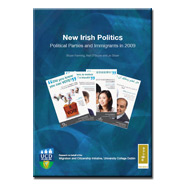Posted 20 APRIL 2009
Immigrants still face real barriers to voting in Irish local government elections, says report
Immigrants who reside in Ireland without full-citizenship have a right to vote in the upcoming local government elections. However, due to experiences in their native country, some immigrants are not comfortable attending Garda stations to register to vote, according to a report published today.
The “New Irish Politics: Political Parties and Immigrants in 2009” report has called for the Gardai to have no jurisdiction in this area and for registration to be made the responsibility of the local authority’s franchise office.
“The right to participate in local elections offers a crucial mechanism for integrating non-citizen immigrants into Irish society,” says Dr Bryan Fanning from the UCD School of Applied Social Science, who prepared the report on behalf of the Migration and Citizenship Initiative at University College Dublin. “All potential barriers preventing immigrants from voting in local elections must be tackled.”
“In 2004, the idea of responding to immigrants who had the right to vote in local elections was still foreign to all Irish political parties,” he says. “But by April 2009, with the exception of Sinn Fein, all of the political parties have selected a number of ‘immigrant candidates’ to represent them in the local elections.”
“Now Irish political parties are proactively asking immigrants for their vote in the local elections and they are strongly anticipating that the ‘Irish’ electorate is willing to vote for ‘immigrant candidates’.”
Since the first report of this kind in 2004, there have been noticeable improvements by the political parties to encourage immigrants to become involved in the local elections. However, according to the latest report, several barriers still remain including:
- The efforts of parties to integrate immigrants and ethnic minority communities will not be successful unless they develop systems for consulting and listening to immigrant members. Political parties need information systems that show whether initiatives aimed at promoting inclusion are working
- Although efforts have been made to encourage immigrants entitled to vote in local elections onto the electoral register, immigrant candidates, members of political parties, and individuals active in voter registration campaigns all expressed their concern that the message is not getting across to many immigrants that they are entitled to vote in local government elections
- Unless more immigrants get the right to vote in general elections their needs are likely to be ignored as they were in the 2007 general election. There needs to be active promotion of naturalisation among members of the immigrant community in Ireland
The findings of the report show that Irish political parties find it difficult to measure the success of their efforts to reach out to immigrants and members of ethnic minorities.
“None of the parties have an established practice of monitoring membership officials and a number of them had to go through membership rolls to try and estimate - on the basis of surnames – how many members they had attracted from different communities. There was no clear access to data on membership that would enable political parties to engage more successfully with immigrant communities.”
According to Dr fanning, political parties need to consult with their members on such issues and set up a system that allows members to self-identify on a voluntary basis. “The parties, especially the larger ones, need to put in place schemes for mentoring immigrant members. A number of interviewees discussed how their choice of party was shaped by the extent they believed they would be listened to and taken seriously.”
Both Fianna Fail and Fine Gael appointed integration officers and ran high profile campaigns to attract Polish members, but no similar efforts have been made to attract Africans, even though Africans were the most politically engaged in the 2004 elections and collectively represent the second largest immigrant community in the Republic after Poles. Fianna Fail estimates that it has attracted a greater number of African members than it has Polish members.
Immigrants have long played a role in Irish politics. James Connolly was from Glasgow, Jim Larkin from Liverpool and Eamon de Valera was born in New York to Cuban and Irish parents. In more recent years, the South African, Dr Moosajee Bhamgee was elected as a TD for Clare.
For the New Irish Politics: Political Parties and Immigrants in 2009 report, each of the five political parties was asked questions similar to those posed for the reports prior to the 2004 local government elections and the 2007 general election. The questions were followed by interviews with officials involved in working with immigrants on behalf of the political parties; with some immigrant candidates and immigrant members of the political parties; and with immigrants active in voter registration and standing as independent candidates in the 2009 local elections.
These research forms part of an ongoing IRCHSS funded Integrated and Social Change Research project that will run until 2010.
- The full report is available for download from www.ucd.ie/mcri

